SEDAYNE: ZITHER SONGS / Ploughmyth 3405
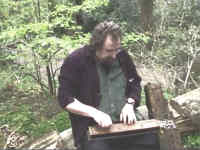
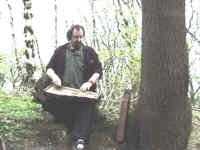
Although more than happy to take my place as an anonymous voice in many the singaround these last thirty years or so, I have never thought of myself as a Folk Singer per se, nor yet even as a musician; if pushed, I'll admit to being a philosophical storyteller seduced by the beauty of traditional narrative balladry, seasonal & ceremonial folk song, organological diversity and consequent sound-magic.*
To this end the CITERA came into my life in the January of 2005, thus reinvigorating the notion of traditional song by lending itself perfectly to many such in my repertoire that had gone unsung for want of ideal accompaniment. I can sing without accompaniment, but I prefer to have something for my voice to resonate against, and the citera is ideal in this respect: its 5 unison melody strings augmented by 17 drone strings (over 2 octaves) enabling a monophonic approach that is anciently appropriate to the modal nature of these songs.
In the ancient modal music, there are no 'keys' as such - rather modes, each using as its tonic (the dominant or drone note) the notes of the ostensible 'major scale' derived from the Pythagorean 'Cycle of Fifths', itself known as the 'Ionian Mode'. The drone is the dominant feature of modal music - be it a Highland Piobaireachd or an Indian Raga - and on the Hungarian Citera the ratio is twelve drone strings (tuned in unisons, octaves & fifths over a range of two octaves) to a mere five unison melody strings, these latter being arranged as two double & one single course. Rarely on such an instrument does one play anything but a single monophonic line; occasionally (as in the case of 'The Colliers Rant') that line is harmonised by trailing a 'third' behind each note; 'chords' are anathema to modal music (the reason many folk guitarists use 'open tunings' to accompany traditional songs is to give it a more 'modal' feel).
Whilst I fully acknowledge the unchanging drone might be monotonous to the modern ear, this is the fault of the modern ear, and not the music. For someone brought up with the droning monotony of both the Highland & Northumbrian bagpipes, this is not even an issue, let alone a problem. I remember such a complaint being made by a reviewer in Folk Roots about the Ocora CD of Norwegian Langeliek music (the Langeliek is a similar class of zither to the citera); surely anyone with genuine love of traditional music forms must first attune themselves to the fact that herein things are going to be a little different. The songs here are sequenced for modal & rhythmic diversity - the drones might be the same, but the modes provide the contrast, subtle maybe, but it's there to those willing to listen for it.
To further break things up, two of the songs are accompanied using the HUMMEL, a Swedish variant of the European board-zither in my keeping now 25 years. Both the Citera & Hummel might be considered 'primitive', each instrument being over 100 years old and belonging to a continuity reaching back via the monochords of Pythagoras to the wellsprings of a monophonic tradition which gave rise to these songs in the first place. Thus might I justify singing George Bruce Thompson's epic M'Gintie's Meal & Ale to the accompaniment of an 150 year old Hungarian zither, quite apart from the fact that it feels right & proper to do so.
Disk One, The Wax Baby, is a sequence of 'folk' & otherwise 'traditional' songs (trad. arr. Sedayne) simply recorded, live in the kitchen** throughout March & April 2005 at the Small Palace, with no multitracking (or subsequent editing) using two microphones, one each for the voice & instrument. Disk Two, The Chapters Session, was recorded in May 2005 by way of rehearsal whilst on holiday in Wells for a gig up in Derby, & as well as songs (including a second shot at M'Gintie's to get the extra chorus in) features elements of storytelling & one-man bandering in which the citera becomes the drone for both pocket-trumpet & melodica: as with disk one, no multitracking was used whatsoever on these recordings.
* Don't take this statement too literally, as one reviewer did, thus missing the irony that I've been singing traditional songs all of my life, which makes me a singer of traditional folk songs, rather than a folk singer - a subtle but significant difference.
** The 'kitchen' in which I record is actually the old front room of an erstwhile back-house of a former colliery 'double-row' of back-to-back terraced houses in a now-peaceful ex-mining village in the beautiful Deerness Valley, some seven miles west of Durham City. It was knocked through to its front neighbour to form a single house at some point in the 1980s. To sing a song like 'The Colliers Rant' in such a setting is to conjure forth a very particular kind of magic: ever respectful of those who have gone before - be they the tenants of the song, or of the former 'back-house' to whom, no doubt, this song would have been very familiar.
Even in its industrial heyday, the photographic record shows the colliery nestling in the rolling wooded valley of the River Deerness - and it was in those same ancient woodlands the colliers tunnelled their drifts into the valley sides. The archaeology is everywhere - rusting rails in the blossoming hedgerows of may; the forged iron cables that once hauled the wagons now embedded in the wayside, grown over with garlands of blue vetch and yarrow - and the bricked up entrances to the shafts themselves, deep in the larch-woods: crossing places between the one world and the other, interfaces between the light world and dark, places where even Orpheus would have fear to tread, watched over to this day by the deer and fox. Such mythological strands run deep - it certainly figures in the songs - and it was this awareness that determined my approach to their performance.
Disk One: The Wax Baby / 76.51
being Ten Traditional Ballads Self-Accompanied on Citera & Hummel)
1) The Colliers' Rant / 8.34
From Joseph Crawhall - A Beuk O' Newcassel Sangs (1888; reprinted Frank Graham, 1965) & the singing of Clive Powell of Northumberland and Frank Williams of Durham. Citera.
As me an' my marra was gannin' tae work,
We met with the devil & it was in the dark;
I up with me pick & it was in the neet,
I lopped off his horns, likewise his club-feet.
Follow the horses, Johnny me laddie,
Follow them through, me canny lad, oh;
follow the horses, Johnny me laddie,
Aye lad lye away, me canny lad oh.
As me an' my marra was puttin' the tram,
The lowe it went oot, an' my marrra gat wrang;
ye wad ha'e laughed had ye seen the gam,
the de'il got me marra, but' aa gat the tram.
O marra! oh, marra! Oh what dost thou think?
I've broken me bottle an' spilt aal me drink,
I've lost a' my shin-splints amang the geet stanes,
Drive me to the shaft lad, it's time to gan hyem.
O marra, oh, marra! Oh where hast thou been?
Drivin' the drift frae the law seam;
Aye drivin' the drift frae the law seam;
Hold up the lowe, lad; de'il stop oot thy e'en.
O marra, oh, marra! This is wor pay week,
We'll get penny loaves an' drink to wor beak;
We'll fill up the bumper, and roond it shall go,
So follow the horses, Johnny lad oh.
Here's me horse, an' here's me tram;
Twa horns full o' grease will mek her to gan,
Here's me pit-hoggars, likewise my half-sheen,
Aye, smash me heart marra, me puttin's all de'en
So follow the horses, Johnny me laddie,
Follow them through, me canny lad, oh;
Follow the horses, Johnny me laddie,
Aye lad lye away, me canny lad oh.
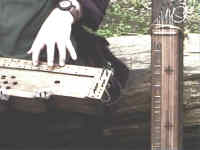
2) Sir Olaf / 8.52
From the singing of Elizabeth Mood of Northumberland, who suggested it was from the Shetlands; otherwise unknown. Citera.
Sir Olaf went out at early day
(the dance goes well so well in the grove)
& there he came on an elf dance gay
(and we'll tread the dance in the morning)
The elf lord reached out his white hand free
come Sir Olaf tread the dance with me
O not I will & not I may
tomorrow it is my wedding day
The elf lady reached out her white hand free
come Sir Olaf tread the dance with me
O not I will & not I may
tomorrow it is my wedding day
The bride unto her maid spoke so
what does it mean that the bells thus go?
Tis the custom of this our isle they reply
that each young swain ringeth home his bride
The truth to you to tell I fear
Sir Olaf is dead & is laid in his bier
And on the morrow e'er light was the day
round Sir Olaf's house three ghosts did stray
It was Sir Olaf and his young bride
& also his mother of sorrow she died
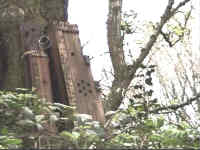
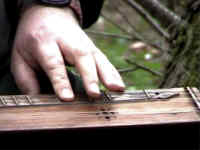
3) The Birth of Robin Hood / 7.46
AKA Willie & Earl Richard's Daughter (Child 102A) from Robert Jamieson's Popular Ballads & Songs (Edinburgh 1806); being without a tune, I set this to the melody of the Balladelle Bergeronnette Douce Baisselete by Northern French trouvere Adam de la Halle (1237-86) from his Le Jeu de Robin et Marion which, whilst not concerning Robin Hood per se, nevertheless prefigures much that we have come to associate with the legend. Hummel.
Willie's large o' limb and lith and come o' high degree
And he is gane to Earl Richard to serve for meat and fee
Earl Richard had but ae daughter, as fair as a lily flower and -
they made up their love contract, like proper paramour
It fell upon a summer's nicht when the leaves were fair and green
That Willie met his ain true love intil the wood alane
Oh narrow is my gown Willie, was wont to be sae wide and -
gane is a' my fair colour that wont to be my pride
But gin my father should get word what's past between us twa
Before that he should eat or drink he'd hang you o'er the wa'
But ye'll come to my bower, Willie, just as the sun gaes down and -
keep me in your arms twa and letna me fa' down
And when the sun was now gane down, he's ta'en him till her bower
And there by the lee licht o' the moon, her window she lookit o'er
Intil a robe o' red scarlet she lap fearless o' harm and -
Willie was large o' lith and limb and keepit her in his arms
And they've gane to the gude green wood and ere the night was deen
She's born to him a bonny young son amang the leaves sae green
When night was done and day was come the sun began to peep up
and raise the Earl Richard out o' his drowsy sleep
An' he's ca'd upon his merry young men by ane, by twa, and by three
Sayin' what's come o' my daughter dear that she's nae come tae me?
I dreamt a dreary dream last night - God grant it come to good I
dreamt I saw my daughter dear drown in the salt sea flood
But gin my daughter be dead or sick or yet be stown away
I make a vow, and I'll keep it weel an' I'll hang ye ane and a'
They sought her back, they sought fore, they sought her up and down they
got her in the good green wood, nursing a bonny young son
He took the bonny boy in his arms an kissed him tenderly
Saying though I would your father hang your mother's dear to me
he's kissed him ower and ower again my grandson I thee claim and
Robin Hood in good green wood that shall be your name
Aye and mony ane sings o' grass o' grass, aye and mony ane sings o' corn
And mony ane sings o' Robin Hood, kens little where he was born;
It wasna in the ha', the ha' - nor in the painted bower but
it was in the good green wood amang the lily flower
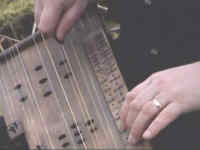
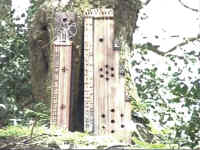
4) Denny the Piper / 6.18
From The Faber Book of Popular Verse (1971) & the singing of Geoff Burton of Kent. The story of The Cow Ate the Piper is common enough, and certainly popular in the current storytelling revival, but one wonders which came first, the song or the story? Citera.
In the year '98, when our troubles were great, it was treason to be a Milesian;
Aye that back-whiskered set, we would never forget, that our history tells us were Hessians.
And in those troubled times, there was all sort of crime and murder it never was rifer;
near the town of Glencree, not an acre from me, there lived one Denny Byne, the piper.
Niether wedding nor wake was worth an owld shake if Denny was first not invited;
For in squeezing the bag or at emptying kegs, he astonished as well as delighted.
But in those times Denny could not win the coin; martial law had a sting like a viper;
and it kept him within, til his bones and his skin were agrin through the rags of that piper.
Twas one heavenly night with the moon shining bright coming home from the fair at Rathangan
When what should he see in the branch of a tree but the corpse of a Hessian there hanging;
says Denny: those rogues have got bots, I've no brogues; and he took hold of the boots with a griper
But the boots were so tight and he pulled with such might legs and all came away with the piper.
Aye then Denny did run for fear of being hung til he came to owld Tim Grady's cabin;
Says Tim from within: I can can not you in you'll be shot if you're caught out there rappin.
So he went to the tent where the cow was in bed and began with a rag for to wipe her;
and they lay down together in seven foot of heather and the cow took to hugging the piper.
And the day it did dawn and Denny did yawn as he stripped off the bootsw from the Hessian
And the legs for the law he just left in the straw as he slipped on with his new possessions.
And breakfast being done, Tim sent his young son, to make Denny leap like a lamp lighter
But the legs that he saw did cause him to roar: Oh Daddy, the cow's ate the piper!
Ah bad luck to that baste, she'd a musical taste to eat such a jolly young chanter;
here Patrick avic, take this lump of a stick, tie her up for the road asnd we'll cant her.
Aye the nighbours were called, Mrs Kennedy bawled, they began for to humbug and jibe her,
but to the church yard she walks with the legs in a box, crying out we'll be hung for the piper.
And the cow she was drove a mile or two off til the came to the fair at Glenealy;
and the cow she was sold for four guinees in gold to the clerk of the parish, Sean Daly;
And they went to the tent and the luck-penny spent, Tim being jolly old swiper;
Aye but who should be there, playing the Rakes of Kildare? It was one Denny Byrne the piper.
Aye then Tim he did jolt like a half drunken colt as he stared at the piper like a grommach;
and he says, by the pwers, I thought these eight hours you were playing in old Drimindhru's stomach.
And Denny observed how these Hessians were served, he began for the laugh and to caper,
And without any regret, their whistles they wet, and like devils they danced round the piper.
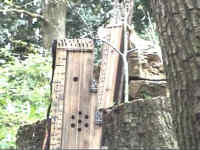
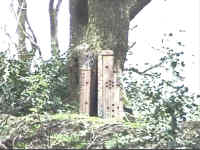
5) The Wee Wee Man / 8.04
Child 38A - sourced from various collections, though always without a tune; my version uses a traditional melody from Brittany (I know Ray Fisher has the monopoly on setting Scottish ballads to Breton tunes - see below - but this one was done by me). I first came across the last couplet in Ballads & Ballad Poems (Dent, 1921) & though at odds with the rest of the song, I've included it by way of purposeful merriment in celebration of the fact that, although originally conceived for the hurdy-gurdy I no longer have, The Wee Wee Man now finds its true home on the citera.
As I was walking all alane, between a water and a wa'
Oh there I spied a wee wee man, and he was the least that I ever saw
His legs were scarce a shathmont's length, aye an thick an thimber was his thigh;
between his brows there was a span; between his shoulders there was three.
Oh he picked up a mickle stone and he flang it as far as I could see;
though I had been a Wallace wight, I couldna lifted it to me knee.
Oh Wee Wee Man, but thou art strong; oh tell me where thy dwelling be?
My dwelling's down by yon bonny bower - will ye go with me and see?
On we lap and away we rade;
til we come tae yon bonny green.
We lighted down to bait wa horse
and out of there cam a lady fine.
Aye four and twenty at her back, and they were all clad oot in green;
if the king of Scotland had been there, the worst o them wad hae been his queen.
On we lap and away we rade,
til we came tae yon bonny ha.
Where the roof was o' the beaten gowld
and the floor was all o' crystal a.
And when we cam tae that stair foot, ladies were dancing jimp an' sma;
but in the twinkling o' my eye, my wee wee man, was clean awa.
Out gaed the lights, down came a mist, ladies nor manny mair could I see;
I gae aboot and take a look, just at the foot o' Benachie.
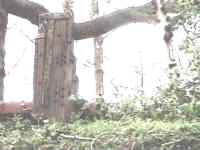
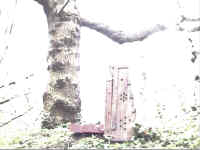
6) Robin Sick and Weary / 8.40
From the singing of Thor Ewing of Bedfordshire & The Faber Book of Popular Verse.
Robin was the sickest bird that ever yet did fly;
and he would have his testament made before that he should die
Singing: tiddle iddle inkin rinkin tinkin; tiddle iddle inkin teary;
heathery-tethery; heathery tarn: Robin's sick and weary.
You take out my bonny eyes that used to blink sae bright;
and give them to yon seemster lass to save her candlelight.
You take these bonny feathers o' mine, the feathers about my nib;
and give them to yon lady fair to fill her feather bed.
Oh you take off my bonny nib that used to peck the corn;
And give it to yon little heard boy to be a tooting horn.
You take off my bonny wings that used to spread so wide;
And give them to Saint Mary's kirk to cover the sunny side.
And you take off my bonny tail it is so broad & brown;
And give it to yon bonny bride to be her wedding gown.
And you take off my legs on which I used to trudge;
and give them to yon well-water as pillars for the bridge.
Ye take this good right leg o' mine to mend the brig o' Tyne;
it'll mak a girder braw and strong that'll never twist nor byne.
Ye take this good left leg o' mine to mend the brig o Wear;
it'll be a post an pillar strong that'll never bow or steer.
In then came yon cutty wren with mony a sigh and groan;
what care I for all the lads if my wee lad be gone?
Then Robin turned him round about, e'en like a little king;
go make my bed as well you know ye little cutty queen.
Then you trail your ten oxen and take me tae the hill;
And part all & part me small that the hungry may get their fill.
When Robin had his testament made, he had no more to say;
and down there came a hungry hawk & snatched him right away.
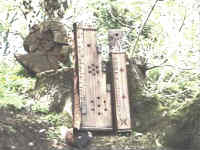
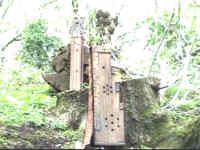
7) Twa Corbies / 7.35
Variant of The Three Ravens (Child 26); from The Legendary Ballads of England and Scotland compiled & edited by John S. Roberts, Chandos Classics 1900 (?) from Mr. Motherwell's Collection; possibly Canadian - otherwise unknown, apart from the last line which has been grafted on from the more well known version set by Ray Fisher in the 1970s to the melody of the Breton folk song An Arlach Ar, now accepted as 'traditional'. The melody here, such as it is, evolved in free-style ballad singing around the folk-clubs of the North East of England during the late 1980s, subsequently modified for performance with the citera.
O there were twa corbies sat on a tree; large & black as black might be;
an' the ane unto the ither gan say: aye, where shall we gan & dine today?
Shall we dine by the wild salt sea? Or shall we dine 'neath the greenwood tree?
As I sat by the deep sea strand, I saw a fair ship nigh at land;
I waved my wings I beat my beak, that ship it sunk & I heard the shriek.
Aye, the drowned ones lie, one, two & tree; I shall dine by the wild salt sea.
Come and I'll show ye a sweeter sight, there's a lonesome glen & a new slain knight;
an' his blood yet on the grass is hot; his sword half drawn, his shafts unshot.
And no one knows that he lies there, but his hawk, & his hound, & his lady fair.
His hound is to the hunting gone; his hawk tae fetch the wild fowl hame;
and his lady's awa' with another man, so we maun make our dinner long:
our dinner's sure, our feasting free, come & dine 'neath the greenwood tree.
Ye shall sit out on his white hause-bane, while I'll pike oot his bonny blue een;
An' ye'll take a tree of his yellow hair to theek wa nest when it grows bare:
the gowlden down on his young chin will do tae row my young ones in.
Aye cold and bare his bed will be when winter storms sing in the tree;
At his head a turf, at his feet a stone; he'll sleep nor hear the maiden's moan
Ower his white bones the birds shall fly, the wild dear bound & foxes cry:
Ower his white bones, when they are bare, the wind shall blaw for ever mair;
Ower his white bones, when they are bare, the wind shall blaw for ever mair.
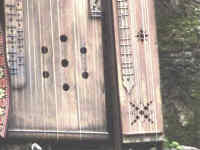
8) The Wax Baby / 7.44
AKA Willie's Lady, or The Witch Mother (Child 6A); from The Legendary Ballads of England and Scotland & elsewhere. The Belly Blind, or Billie Blin, '....is the familiar spirit of Scottish superstition; he was domestic in his habits, doing all manner of household and farm duties during the night for the family he attached himself to. Any question put to him as to his personal appearance, which was somewhat uncouth, would drive him away from his voluntary servitude...' (J. S. Roberts). The song is usually sung to the tune of the Breton song Son Ar Chistre, another of Ray Fisher's weldings that has found its way into the tradition, largely thanks to Martin Carthy. Here I sing it to my own tune which is somehow derived from a Scandinavian lullaby, though what that was I now couldn't possibly say. Hummel.
Willy's tae'en him ower the fame, aye an he wooed a wife an he's brought her hame
An he wooed her for her gowlden hair, but his mother wrought her a meikle care;
aye an miekle dolour gard her drie for lighter can she never be;
But in her bower she lies in pain while Willy mourns ower her in vane.
Unto his mother then he has gone that vile rank witch o' the vilest kin
And he says my lady has a cup wi gowld and silver set about
This goodly gift shall be yer ain let her be light o her young bairn
Oh of that bairn she'll ne'er be light nor in bower tae shine sae bright;
But she will die and turn to clay, and ye will wed another may
Anither may I'll never wed, another may I'll ne'er bring home
But sighing says this weary man I wish my life were at an end.
Unto his mother then he has gone that vile rank witch o' the vilest kin
And he says my lady has a steed the like o' which you ne'er did see
For she is gowlden shod behind and she is gowden shod before
And at inlka tet of this horse's mane hangs fifty silver bells and ten
this goodly gift shall be yer own let her be light o her young bairn;
Oh of that bairn she'll ne'er be light nor in bower tae shine sae bright
But she will die and turn to clay and ye will wed another may
Anither may I'll never wed, another may I'll ne'er bring home
But sighing says this weary man I wish my life were at an end
Then up an spoke the Belly Blind and aye he spake in goodly time
He says get ye down unto the market place and there ye buy a loaf of wax
Ye shape it bairn and bairny like and in twa glassen een ye put
And get ye then tae yer mother again and bid her come to the christening;
and ye maun stand a little foreby, aye an listen weel what she do say
Willy's ta'en him unto the market place and there he bought a loaf o wax
An he's shaped it bairn and bairny like, aye and in twa glassen een he put
And he is away tae his mither then and bid her come to the christening
Aye and he has stood him a little foreby, aye and listened weel what she do say
She said: who was it undid the nine witch knots I braided in amongst his lady's locks?
and who was untook the combs of care I braided in amongst this lady's hair?
And who was it killed the master kid that ran & slept all beneath her bed?
And who was it unloosed her left foot shoe and letten than lady lighter be?
And it was Willy undid the nine witch knots she'd braided in amongst his lady's locks
And it was Willy took oot the combs of care she'd braided in amongst this lady's hair
And it was Willy killed the master kid that ran & slept all beneath her bed
And it was Willy unloosed her left foot shoe and letten than lady lighter be
And she has born him a bonny young son & miekle praise be them upon
And she has born him a bonny young son an miekle praise be them upon
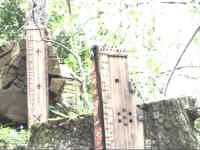
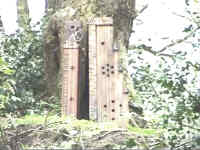
9) M'Ginty's Meal an Ale / 8.59
From the singing of Davie Stewart & A Book of Scottish Ballads. A Meal-an-Ale is a harvest supper; the story being basically that of a pig drunk on whisky and the disorder consequent on such an inebriation. Citera.
This is nae a sang o' love, nor yet a sang o' money, if there's naething very pitiful an' naething very funny; but there's Heelan' Scotch, an' Lowlan' Scotch an' Butter Scotch an' honey; if there's nane o' them for a' there's a mixtur o' the three; an there's nae a word o' beef-brose, sowans, sautie bannocks; nor o' pancakes and pess eggs for them wi' dainty stammacks. But it's all aboot a meal-an'-ale that happened at Balmannocks; M'Ginty's meal-an-ale far the pig gaed on the spree.
They were howlin' in the kitchen like a caravan o' tinkies, an some wis playin' ping-pong an' tiddly-widdly-winkies; but up the howe an doon the howe there never was such jinkies as M'Ginty's meal-an-ale far the pig gaed on the spree.
M'Ginty's pig had broken loose an wan ert tae the lobby for he'd open shoved the pantry door an came upon the toddy; and he gaed kindly tae the stuff like any human body at M'Ginty's meal-an-ale far the pig gaed on the spree. Miss M'Ginty she ran but the hoose, but the road wis dark and crookit, she fell heelster-gowdie ower the pig for it she never lookit, and she let oot a skirl that wad a paralyst a teuchit at M'Ginty's meal-an-ale far the pig gaed on the spree.
Young Murphy he ran after her an ower the pig wis leapin', but he trampit on an ashet that was sittin full o' dreepin - and he feel doon an peelt his croon an' couldnae haud frae greetin' at M'Ginty's meal-an-ale far the pig gaed on the spree. For the pantry shelf cam rickling doon and he was lying kirnin', among the soft soap the peese meal the corn floor and yirnin', like a gollach amang the treacle but M'Ginty's wife was girnin' at the mess upon her pantry floor and wouldna let him be.
Then they a ran skirlin' tae the door, an' foon that it was ruggit; for it aye heeld the faster more, aye the more they tuggit; til M'Ginty roared tae bring an axe, he wadnae be hum-buggit, nor even lockit in his ain hoose an' that he let them see. So the wife cam trailin' wi the axe, an through the bar wis hackit, and open flew the door at once, so close as they were packit: an' all the crew came tumblin' oot like tatties frae a buckit at M'Ginty's meal-an-ale far the pig gaed on the spree.
They hid spurtles, they had tattie-chappers and troth they werenae jokin', for they said the gar the pig the claw, for he was never yokin', but by this time the lad was drunk and didnae care a dokin' at M'Ginty's meal-an-ale far the pig gaed on the spree. Oh there's eely-pigs an jeely-pigs and pigs for haudin' butter, aye but this wee piggy was greeting drunk and tumblin' in the gutter, til M'Ginty an' his foreman trailed him oot upon a shutter frae M'Ginty's meal-an-ale far the pig gaed on the spree.
Miss M'Ginty took the thing tae heart and hidet in the closet and they rubbit Johnny Murphy's heed wi turpentine an roset, an they harlit him wi meal-an-ale, ye really wid suppose it, for he'd sleepit in a masons trough and risen tae the spree. Oh weary on the barley bree, and weary frae the widder, for its keegerin' amang the dubs an drink, they gan nae weel the-gidder, but there's little doot M'Ginty's pig is wishin' for another o' M'Ginty's meal-an-ales far the pig gaed on the spree.
Oh they were howlin' in the kitchen like a caravan o' tinkies, aye; an some wis playing ping-pong an' tiddly-widdly-winkies; but up the howe an doon the howe there never was such jinkies as M'Ginty's meal-an-ale far the pig gaed on the spree.
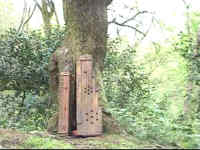
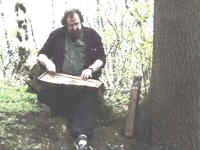
10) Whetsone / 3.46
From The Faber Book of Popular Verse; 16th century - the whetsone is the prize for the best liar, to keep the tongue good and sharp. The tune is my own. Citera.
I saw a dog seething souse & an ape thatching a house;
And a pudding eating a mouse: hey, hey, hey, hey - I will have the whetstone & I may
I saw a hedgehog shape and sew & anoder bake an brew;
Scour the pots as they were new: hey, hey, hey, hey - I will have the whetstone & I may
I saw codfish barley sow & heard a worm his whistle blow;
And a pye wis treading on a crow: hey, hey, hey, hey - I will have the whetstone & I may
I saw a stock-fish drawing a harrow & anoder driving a barrow;
And a salt-fish shooting an arrow: hey, hey, hey, hey - I will have the whetstone & I may
I saw a boar his burdens bind & a frog his clewens wind;
and a toad his mustard grind: hey, hey, hey, hey - I will have the whetstone & I may
I saw the sow bear breeks to wash & the second yin had a hedge to plash;
The third yin went in the barn to thrash: hey, hey, hey, hey - I will have the whetstone & I may
I saw an egg eating a pie - oh give me a drink my mouth is dry;
It's ten lang year since I told a lie: hey, hey, hey, hey - I will have the whetstone & I may
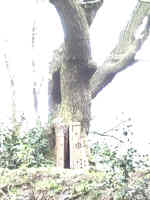
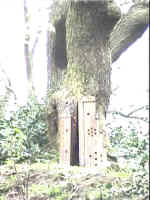
Recorded throughout March & April 2005 at the Small Palace, County Durham UK; all live performances, no multitracking or subsequent editing. Images by Rachel McCarron, Houghall Woods, Durham City, May 1st 2005.
Disk Two: The Chapters Session / 77.10
This consists of a session recorded in the attic room of The Chapters Guesthouse, Wells, Somerset on the morning of Sunday the 8th of May 2005 in preparation for a solo storytelling gig at the Voicebox in Derby the following Wednesday. It has long been my habit in rehearsal situations to use recording equipment as a surrogate audience; a couple of well place condenser microphones (in this case an ADK A-51 V for the citera & a Behringer B1 for the voice, pocket trumpet & melodica) creates a necessary & ceremonial tension, a not-quite studio formality wherein the essentially improvisatory craft of ballad singing & storytelling is urged into action.
1) May Horn - Astray - Four Acre in the Day / 6.37
A traditional opener for a solo Sedayne performance, mood of occasion / audience notwithstanding; May Horn features ill advised attempt at playing pocket trumpet & citera simultaneously; Astray is as complete a rendering as my failing memory allows; Four Acre in the Day is a version of the old Mutton Pie I first heard sung by Jim Eldon. If the sequence sounds inconclusive allow for a further segue into Orfeo...
aye listen close and it shall be told / and stir not from your places / and open not your eyes / and take of no food nor take of drink / and let your ears hear whatever it is that they hear / and let your mind think whatever it is that it thinks / aye listen / for is that not the hare that passes by this place? / I have seen it / ye hopper of ditches / a cropper of corn / and a wee brown cow / a wee brown cow with a pair of leather horns / aye milk the dark with your shuddering run / beast of no claiming / aye shatter the year by your turning shadow / rested / unseen / unseeing / aye in this place / one eye shall become open / and that eye will leap from out of the head / and go as a fish in the silver steam / and my tongue shall fly out of my head and go as bird / aye go as bird from tree / to tree / aye let them go from this place / and let them return hither / and the fish shall once more return here / once more becoming my eye / and the stream will be tears of joy and sadness / aye the bird shall once more return here / once more becoming my tongue / aye the trees become words / chosen / one to the other / is not my story the forest? / is not the stream the waters of this life that wash over this forest giving it the dance of living? / aye listen / for is that not the stag that passes by this place? / I have seen it / stir not / for in stirring we shatter the silence...
aye now me jolly lads if you want to plough / come to Ironheads and he'll show you how / if that there be true me lads / as I have heard them say / he wants you to plough four acre in the day / with the fol-the-diddle-di-do / fol-the-diddle-de / oh he's got four horses and they are very thin / and their ribs they are real right tight to the skin / there's one knocky-kneed / and the other swing in back / and he learns them to go with a whoop-gee-back / with the fol-the-diddle-di-do / fol-the-diddle-de / up come boss aye, this he did say / there's a yew been dead for a month and a day / fetch her up, Bullocky / fetch her on the sly / it'll make these lads some rare mutton pie / fetch her up Bullocky / fetch her on the sly / it'll make these lads some rare mutton pie / aye we put her on the table / the maggots running thick / and Bullocky was walloping them off with a stick / with the fol-the-diddle-di-do / fol-the-diddle-de / our old missus she's a treat / she makes such pies that none could eat / with a crust made of iron / and a belly full o' clay / that'll rattle in your guts for a month and a day / with the fol-the-diddle-di-do / fol-the-diddle-de / our old missus had a maid named Alice and thought she was fit to live in the palace / oh live in the palace and be a queen / I'm damned if she was fit to be seen / with the fol-the-diddle-di-do / fol-the-diddle-de / oh there were twa corbies sitting on a tree / aye large and black as black might be / and the ane unto the other gan say / aye where shall we gan and dine the day?
ii) King Orfeo / 8.06
Child 19. This song has been with me 1975, when I first picked upon it at the tender age of fourteen; of late it's featured in proximal virtuality on Venereum Arvum's Scowan Urla Grun, here it resounds similarly, albeit in real-time with the citera. Scowan Urla Grun / Whar Giorten Han Grun Orlac somehow translates as Early Green's the Wood, Where the Hart Runs Yearly.
Oh there lived a king inta da east / scowan urla grun
there lived a lady in da west / whar giorten han grun orlac
this king he has a hunting gane / scowan urla grun
and left his lady Isabel alane / whar giorten han grun orlac
o I wish ye'd never gane awa / scowan urla grun
for at yer hame is dole an wae / whar giorten han grun orlac
for the king o fairie wi his dart / scowan urla grun
has pierced yer lady tae the heart / whar giorten han grun orlac
an after them the king has gane / scowan urla grun
but when he cam it was a grey stane / whar giorten han grun orlac
dan he took out his pipes tae play / scowan urla grun
though sore his heart wi dole and wae / whar giorten han grun orlac
an first he played the notes o' noy / scowan urla grun
and then he played the notes o' joy / whar giorten han grun orlac
aye an then he played da good gabber reel /scowan urla grun
that might hae made a sick heart hale / whar giorten han grun orlac
noo come ye in inta wir ha' / scowan urla grun
and come ye in amang wis a' / whar giorten han grun orlac
noo he's gone in inta their ha' / scowan urla grun
and he's gone in amang them a' / whar giorten han grun orlac
dan he took out his pipes tae play / scowan urla grun
though sore his heart wi dole and wae / whar giorten han grun orlac
an first he played the notes o' noy / scowan urla grun
and then he played the notes o' joy / whar giorten han grun orlac
an then he played da good gabber reel / scowan urla grun
that might hae made a sick heart hale / whar giorten han grun orlac
noo tell tae us what ye will hae / scowan urla grun
what shall we give you for yer play? / whar giorten han grun orlac
for he'd rode by night and he'd rode by day / scowan urla grun
and owercam all that lay in his way / whar giorten han grun orlac
what I will hae I will ye tell / scowan urla grun
and that's my lady Isabel / whar giorten han grun orlac
ye's take yer lady and ye's gane hame / scowan urla grun
an yees be king ower aal yer ain / whar giorten han grun orlac
he's taen his lady and he's gaen hyem / scowan urla grun
and noo he's king ower aal his ain / whar giorten han grun orlac
3) Bird Robin / 12.34
This is an attempt to bring together Bird (see Venereum Arvum's Bird 2004 & Green As God...) and Robin Sick and Weary (see above), something I first did in storytelling performances eight years ago using the crwth, but it makes more sense with the citera.
Robin was the sickest bird / that ever yet did fly / and he would have his testament made / before that he should die / singing tiddle iddle inkin tinkin tinkin / tiddle iddle inkin teary / heathery-tethery / heathery tarn: Robin's sick and weary
Aye Bird came once / it was Harris lighting fires that brought it / in winter he burned the nest / and egg hatched in fire and Bird was born
You take out my bonny eyes that used to blink so bright / and give them to yon seemster lass / to save her candlelight / singing tiddle iddle inkin tinkin tinkin / tiddle iddle inkin teary / heathery-tethery / heathery tarn: Robin's sick and weary
Bird flew among stars & he looked at the moon / Bird flew among trees 'til resting he came / on the roof / of the crone Kema
You take these bonny feathers o mine / the feathers about my nib / and give them to yon lady fair / to fill her feather bed / singing tiddle iddle inkin tinkin tinkin / tiddle iddle inkin teary / heathery-tethery / heathery tarn: aye Robin's sick and weary
aye Kema took stones & threw them at Bird / but Bird being quick these stones missed Bird / falling instead at the back of the house / where these stones broke the ice / in Kema's well
You take off my bonny nib / that used to peck the corn / and give it to yon little heard boy / to be a tooting horn / singing tiddle iddle inkin tinkin tinkin / tiddle iddle inkin teary / heathery-tethery / heathery tarn: Robin's sick and weary
These stones were however Kema's wall / where wall had once been through there came Bear / Bear went in house to rest before fire & in came Bird / to rest upon Bear
You take off my bonny wings that used to spread so wide / and give them to Saint Mary's kirk / to cover the sunny side / singing tiddle iddle inkin tinkin tinkin / tiddle iddle inkin teary / heathery-tethery / heathery tarn: aye Robin's sick and weary
Aye you take off my bonny tail / it is so broad & brown / and give it to the bonny bride / to be her wedding gown / singing tiddle iddle inkin tinkin tinkin / tiddle iddle inkin teary / heathery-tethery / heathery tarn: aye Robin's sick / aye Robin's sick / aye Robin's sick and weary
So Kema brought bread and gave it to Bird / but Bird would not the bread that she gave / Why not eat this? Kema asked Bird / and Bird said that Bear would be far worse hungry than Bird would be
And you take off my bonny legs / on which I used to trudge / and take them to the well water / as pillars for the bridge / singing tiddle iddle inkin tinkin tinkin / tiddle iddle inkin teary / heathery-tethery / heathery tarn: Robin's sick and weary
Take this good right leg o mine / to mend the brig o' Tyne / it'll mak a girder braw & strong / that'll never twist nor bend / singing tiddle iddle inkin tinkin tinkin / tiddle iddle inkin teary / heathery-tethery / heathery tarn: Robin's sick and weary
So Kema took bread and gave it to Bear / and Bear ate bread but now wished for honey / Kema brought honey and gave it Bear / and Bear ate honey and now wished / for Salmon
Take this good left leg o mine / to mend the brig o Wear / it'll mak a girder braw & strong / that'll never bow nor steer / singing tiddle iddle inkin tinkin tinkin / tiddle iddle inkin teary / heathery-tethery / heathery tarn: aye Robin's sick / aye Robin's sick / aye Robin's sick and weary
So Kema brought salmon and gave it to Bear / and Bear ate salmon but now wished for ale / so Kema brought ale and gave it to Bear / and Bear drank ale and now wished for summer
In then came yon Cutty Wren / with mony a sigh and groan / oh what care I for all the lads? / if my wee lad be gone? / singing tiddle iddle inkin tinkin tinkin / tiddle iddle inkin teary / heathery-tethery / heathery tarn: aye Robin's sick and weary
Bear slept ale-merry by Kema's bright fire / and Kema brought seeds and gave them to Bird / Bird ate seeds & flew among trees 'til resting it came / to the coat of the goat at Kema's well
Then Robin turned him round about / e'en like a little king / go mek my bed as well you know / ye little cutty queen / singing tiddle iddle inkin tinkin tinkin / tiddle iddle inkin teary / heathery-tethery / heathery tarn: Robin's sick and weary
Out of the goat's coat Bird feasted on lice / but tastier still were the worms from his arse / who will morn the fate of those infesting worms? / to be sure, the only tears for them were shed by Bird.
Then you take your ten oxen and trail me to the hill / and part all and part me small / that the hungry may get their fill / singing tiddle iddle inkin tinkin tinkin / tiddle iddle inkin teary / heathery-tethery / heathery tarn: Robin's sick and weary
Aye Bird came once / it was Harris lighting fires that brought it
When Robin had his testament made he had no more to say / and down there came a hungry hawk / & snatched him right away / singing tiddle iddle inkin tinkin tinkin / tiddle iddle inkin teary / heathery-tethery / heathery tarn: aye Robin's sick / aye Robin's sick / aye Robin's sick and weary
4) The Poacher's Fate / 7.41
My favourite of the traditional poaching songs even though the tune here is more or less the same as For He's a Jolly Good Fellow; first heard on The Battle of the Field by The Albion Country Band, the only 'folk rock' album I've ever taken to my heart...
Now come all you lads of high renown that like to drink strong ale that's brown,
And pull the lofty pheasant down with powder, shot and gun.
He's a gallant youth, and I'm telling you the truth,
Oh he's crossed all life's temptations ways, no mortal man his life could save,
Now he's sleeping in his grave, his deeds on earth be done.
Now me and five more poaching went, to get some game was our intent
Our goods were gone and our money all spent, we had nothing left to try.
Now the moon shone bright, not a cloud in sight,
Oh, the keeper heard us fire a gun, to the spot he quickly run,
He swore, before the rising sun, that one of us should die.
Now, the bravest youth among our lot, was his misfortune to be shot,
His deeds will never be forgot, by all of us below.
Now for help he cried, but he was denied
Oh his memory ever shall be blessed, for he stood up, he fought the rest,
While down upon his gallant breast, the crimson blood did flow.
Now this youth he fell down on the ground, all in his breast a mortal wound,
While through the woods the shot did sound, that took his life away.
In the midst of life he fell, aye suffering full-well,
Deep was the wound that the keeper gave, no mortal man his life could save,
And now he's sleeping in his grave, his deeds on earth be done.
Now the murderous man that did him kill, caused his precious blood to spill,
Must wander far against his will, and find no resting place.
Destructive things, his conscience stings,
He must wander through the world forlorn, ever feel the smarting thorn
Be pointed at with the finger of scorn, and die in sad disgrace.
5) Binnorie / 11.06
A variant of Child 21 from the Northumbrian Minstrelsy (Bruce & Stokoe 1882, Society of Antiquaries Newcastle-upon-Tyne / facsimile imprint Llanerch 1998); the strange modality is described therein as a '...true Northumbrian melody...'. 'Binnorie' is understood to be a contraction of 'By Norham', Norham being a village on the River Tweed west of Berwick, famous for its romantic castle ruins.
There were two sisters sat in a bower / Binnorie, o Binnorie
There came a knight to be their wooer / by the bonny mill-dams of Binnorie
He courted the eldest with glove and ring / Binnorie, o Binnorie
But he loed the youngest aboon a' thing / by the bonny mill-dams of Binnorie
He courted the eldest with broach and knife / Binnorie o Binnorie
But he loed the youngest aboon his life / by the bonny mill-dams of Binnorie
The eldest she was vexed sair / Binnorie o Binnorie
And sore envied her sister fair / by the bonny mill-dams of Binnorie
The eldest said to the youngest ane / Binnorie o Binnorie
Will ye go and see our father's ships come in? / by the bonny mill-dams of Binnorie
She's taen her by the lilly white hand / Binnorie o Binnorie
And led her down to the river strand / by the bonny mill-dams of Binnorie
The youngest stude upon a stane / Binnorie o Binnorie
The eldest came and pushed her in / by the bonny mill-dams of Binnorie
She took her by the middle sma / Binnorie o Binnorie
And dashed her bonnie back to the jaw / by the bonny mill-dams of Binnorie
0 sister, sister, reach your band / Binnorie o Binnorie
And ye shall be heir of half my land / by the bonny mill-dams of Binnorie
0 sister, I'll not reach my hand / Binnorie o Binnorie
And I 'll be heir of all your land / by the bonny mill-dams of Binnorie
Shame fa the hand that I should take / Binnorie o Binnorie
It 's twin'd me and my world's make / by the bonny mill-dams of Binnorie
0 sister, reach me but your glove / Binnorie o Binnorie
And sweet William shall be your love / by the bonny mill-dams of Binnorie
Sink on, nor hope for hand or glove / Binnorie o Binnorie
And sweet William shall better be my love / by the bonny mill-dams of Binnorie
Your cherry cheeks and your yellow hair / Binnorie o Binnorie
Garrd me gang maiden evermair / by the bonny mill-dams of Binnorie
Sometimes she sunk, and sometimes she swam / Binnorie o Binnorie
Until she came to the miller's dam / by the bonny mill-dams of Binnorie
The millers daughter was baking bread / Binnorie o Binnorie
and gaed for the water as she had need / by the bonny mill-dams of Binnorie
0 father, father, draw your dam / Binnorie o Binnorie
There's either a mermaid or a milk-white swan / by the bonny mill-dams of Binnorie
The miller hasted and drew his dam / Binnorie o Binnorie
And there he found a drowned woman / by the bonny mill-dams of Binnorie
You could not see her yellow hair / Binnorie o Binnorie
For gowd and pearls that were sae rare / by the bonny mill-dams of Binnorie
You could na see her middle sma / Binnorie o Binnorie
Her gowden girdle was sae bra / by the bonny mill-dams of Binnorie
A famous harper passing by / Binnorie o Binnorie
The sweet pale face he chanced to spy / by the bonny mill-dams of Binnorie
And when he looked that ladye on / Binnorie o Binnorie
He sighed and made a heavy moan / by the bonny mill-dams of Binnorie
sair for them whate'er they be / Binnorie o Binnorie
the hearts that live to weep for thee / by the bonny mill-dams of Binnorie
He made a harp of her breast-bone / Binnorie o Binnorie
Whose sounds would melt a heart of stone / by the bonny mill-dams of Binnorie
The strings he framed of her yellow hair / Binnorie o Binnorie
Whose notes made sad the listening ear / by the bonny mill-dams of Binnorie
He brought it to her father's hall / Binnorie o Binnorie
And there was the court assembled all / by the bonny mill-dams of Binnorie
He laid this harp upon a stone / Binnorie o Binnorie
And straight it began to play alone / by the bonny mill-dams of Binnorie
0 yonder sits my father, the king / Binnorie o Binnorie
And yonder sits my mother, the queen / by the bonny mill-dams of Binnorie
And yonder stands my brother Hugh / Binnorie o Binnorie
And by him my William, sweet and true / by the bonny mill-dams of Binnorie
But the last tune that the harp played then / Binnorie o Binnorie
Was woe to my sister, false Helen / by the bonny mill-dams of Binnorie
6) AU Hinney Burd - Jack Corby / 10.57
A sequence of classic Northumbriana: A U Hinney Burd comes from Crawhall's A Beuk O' Newcassel Sangs (1888; reprinted Frank Graham, 1965), and is of special significance to me because my great-great-grandfather, arriving in Newcastle from County Cork, established himself as a tailor on the Castle Garth stairs. Jack Corby was a sexton at Bedlington in Northumberland who lost a leg in his youth; the song here is based on verses published in The Blyth Gleaner on the occasion of his death in 1819 - the tune is my own. The story of The Sleeping Fox is my own adaptation of a traditional Norwegian folk tale and is here told, rather than recited, and transcribed accordingly; 'Hark Away' is the chorus of the celebrated song The Kielder Hunt written by James Armstrong of Redesdale in the 19th century; & Hartley & Holywell is a possible stray verse from A U Hinney Burd found in The Denham Tracks (A Few Pictures of the Olden Time in Connexion with The North of England) first published in 1858. As ever, there's a stray verse of The Twa Corbies in there too, which can be sung to most tunes....
It's o but I ken weel - A U Hinney Bird
the bonny lass o' Benwell - A U A
She's lang legged and mother-like - A U Hinney Bird
See she's raking up the Dyke - A U A
The quayside for sailors - A U Hinney Bird
The castle garth for tailors - A U A
The Gateshead hills for millers - A U Hinney Bird
The north shore for keelers - A U A
There's Sandgate for auld rags - A U Hinney Bird
An Gallowgate for trolly bags - A U A
There's Denton and Kenton - A U Hinney Bird
And canny Langbenton - A U A
There's Tynemouth an Cullercoats - A U Hinney Bird
An' North Shields for sculler-boats - A U A
There's Westhoe lies iv a neuk - A U Hinney Bird
An South Shields the pleyce for muck - A U A
There's Horton and Holywell - A U Hinney Bird
An bonny Seaton Delaval - A U A
Hartley-pans for sailors - A U Hinney Bird
Bedlington for nailers - A U A
*
I hear old Corby lies in his sleep; grave digging was his occupation
Or ringing the bell, the church to keep; or dusting the pews upon occasion
Aye lame of arm with but one leg; some charity Jack was deserving
But he was too bashful to gan oot an beg; and he'd rather prefer half starving
And his speech and manners, oh they were uncouth; but firm and staunch upon occasion
And he always bluntly told the truth; withoot the smallest deviation
But to hunt the fox was his delight; to get sly Reynard in his clutches
He stopped the fox holes up by night; and by day, he hunted on his crutches
Whenever the fox was in full view; no footman with Jack could keep stitches
As Jack away on his crutches flew; louping nimbly ower hedges and ditches
Well here we find owld Jack Corby / limping his way through the Ha'penny woods at Bedlington / one fine and a grand sunny afternoon / at the back end of July / and he's thinking to himself / he's thinking / life doesn't get any better than this / when just there in the path before him he see there / something russet and red / something russet and red fast sleeping it is / in the light that's coming shining through the leaves above him / and as he gets nearer up to that thing sleeping there he sees exactly what it is / why it's nothing else but a sleeping fox / why, Jack's taking a look at that fox then / and he's thinking to himself / well / a sleeping fox is easier killed than a leaping fox / and once it's dead / who's to know how it was that I killed it? / chances are I took that fox / in a rare chase / ower the hill and ower the dale / ower hedges ditches brooks and bridges and all:
hark away / hark away / ower the bonny hills o' Kielder / hark away
and wouldn't I be the grand hero then when I tell them that particular tale? / because for sure this fox is bound to be the scourge of every gentleman farmer from hereabouts / and they'll be rewarding me well for the hide of owld Reynard / for the brush of his tale indeed / and they'll be giving me a grand big purse of coins / golden coins they'll be / and I'll take those golden coins / and I'll buy myself a fine field / and I'll buy myself a grand old plough / and a horse to pull that plough along / and when the ploughing's done / and when the ploughing's done I'll buy myself a fine sack of corn / to sow in that field / and by the time the next summer's coming on / the people passing by my field will be saying / aye there's Jack's field golden under the sun / it'll be a richer man he'll be when the harvest's done / and knowing the folks from hereabouts they'll be getting jealous at that / so I'll have to be saying to them / I'll have to be saying / aye keep to your own and leave my field alone / will they be taking notice of me if I'm just saying it to them? / no ideed / so I'll have to be shouting it at them / keep to your own and leave my field alone / and I'm thinking they'll be taking no notice of me then either / just shouting it at them / so I'll have to be screaming it at them / keep to your own and leave my field alone / well, old Jack Corby screamed a little bit too loud then did he not? / for he woke up the sleeping fox / and away it went giving him a wee bit of a wink / and leaving Jack Corby with nowt / but the sight of its brush as it disappeared away into hedge / and it's because of this that they say / oh it's best to take what lies in reach / and of your undone deeds of them you should never screech
oh there were twa corbies sitting on a tree / large and black as black might be / and the ane untae the other gan say / aye where shall we gan and dine today?
there's Hartley and Holywell / and fair Seaton Delaval / Earsdon stands on a hill / aye no sae far from Billy Mill
and as for old Jack Corby:
but now his hunting days are done; we hope he'll not be forgotten
it's hoped he will meet up at last; with the honest sportsmen in heaven
7) M'Ginty's Meal an Ale (Beta Version) / 8.45
Similar to the version on Disk One (see above) albeit improved upon, with greater narrative control on the spurtles line (a spurtle, by the way, is a wooden stick for stirring porridge: adorned with a carved thistle & tied off with a tartan ribbon they make a cheap & effective souvenir for visitors to Edinburgh) & additional end chorus from Sheelicks which, once heard, I couldn't resist putting in there.
This is nae a sang o' love, nor yet a sang o' money, if there's naething very pitiful an' naething very funny; but there's Heelan' Scotch, an' Lowlan' Scotch an' Butter Scotch an' honey; if there's nane o' them for a' there's a mixtur o' the three; an there's nae a word o' beef-brose, sowans, sautie bannocks; nor o' pancakes and pess eggs for them wi' dainty stammacks. But it's all aboot a meal-an'-ale that happened at Balmannocks; M'Ginty's meal-an-ale far the pig gaed on the spree.
They were howlin' in the kitchen like a caravan o' tinkies, an some wis playin' ping-pong an' tiddly-widdly-winkies; but up the howe an doon the howe there never was such jinkies as M'Ginty's meal-an-ale far the pig gaed on the spree.
M'Ginty's pig had broken loose an wan ert tae the lobby for he'd open shoved the pantry door an came upon the toddy; and he gaed kindly tae the stuff like any human body at M'Ginty's meal-an-ale far the pig gaed on the spree. Miss M'Ginty she ran but the hoose, but the road wis dark and crookit, she fell heelster-gowdie ower the pig for it she never lookit, and she let oot a skirl that wad a paralyst a teuchit at M'Ginty's meal-an-ale far the pig gaed on the spree.
Young Murphy he ran after her an ower the pig wis leapin', but he trampit on an ashet that was sittin full o' dreepin - and he feel doon an peelt his croon an' couldnae haud frae greetin' at M'Ginty's meal-an-ale far the pig gaed on the spree. For the pantry shelf cam rickling doon and he was lying kirnin', among the soft soap the peese meal the corn floor and yirnin', like a gollach amang the treacle but M'Ginty's wife was girnin' at the mess upon her pantry floor and wouldna let him be.
Then they a ran skirlin' tae the door, an' foon that it was ruggit; for it aye heeld the faster more, aye the more they tuggit; til M'Ginty roared tae bring an axe, he wadnae be hum-buggit, nor even lockit in his ain hoose an' that he let them see. So the wife cam trailin' wi the axe, an through the bar wis hackit, and open flew the door at once, so close as they were packit: an' all the crew came tumblin' oot like tatties frae a buckit at M'Ginty's meal-an-ale far the pig gaed on the spree.
They hid spurtles, they had tattie-chappers and troth they werenae jokin', for they said the gar the pig the claw, for he was never yokin', but by this time the lad was drunk and didnae care a dokin' at M'Ginty's meal-an-ale far the pig gaed on the spree. Oh there's eely-pigs an jeely-pigs and pigs for haudin' butter, aye but this wee piggy was greeting drunk and tumblin' in the gutter, til M'Ginty an' his foreman trailed him oot upon a shutter frae M'Ginty's meal-an-ale far the pig gaed on the spree.
Miss M'Ginty took the thing tae heart and hidet in the closet and they rubbit Johnny Murphy's heed wi turpentine an roset, an they harlit him wi meal-an-ale, ye really wid suppose it, for he'd sleepit in a masons trough and risen tae the spree. Oh weary on the barley-bree, and weary frae the widder, for its keegerin' amang the dubs an drink, they gan nae weel the-gidder, but there's little doot M'Ginty's pig is wishin' for another o' M'Ginty's meal-an-ales far the pig gaed on the spree.
Oh they were howlin' in the kitchen like a caravan o' tinkies, aye; an some wis playing ping-pong an' tiddly-widdly-winkies; but up the howe an doon the howe there never was such jinkies as M'Ginty's meal-an-ale far the pig gaed on the spree.
Hi-hi went the drum, diddle-diddle went the fiddle and the jing-a-ring went up an' doon an' back and through the middle; and the jing-a-ring went roond and roond like sheelicks in a riddle at M'Ginty's meal-an-ale far the pig gaed on the spree
8) Psalm 32 Verse 3 : Northern Star / 11.04
Clive Powell wrote the words of Northern Star to my melody Psalm 32 Verse 3 (see VAS & Splendor Solis) back in 1999 & we've made various recordings featuring Clive's singing (see Northern Star & HYEM); here however, I sing it myself in the context of an improvisation in which I play the melodica & citera simultaneously in echo of the mood of Clive's lyric: a landscape of ciphers, patterns familiar to the North East of England, to Tyneside & South East Northumberland - I see it serving a similar purpose to A U Hinney Burd, a song of hidden & secret naming.
By the tide I lost my footing
Falling - into night
Star's settling light at end of day
Drifting loose I reach my lost home
Dreaming, Northern Star my anchor steady in the bay
Seaward bound depth sounding, trawling
Casting nets in waves the bright prow greets with 'Hope of Day'
Boat planks nailed in holding
Floating, keeping fishes hawled the silver shines in hands of day
Deep in woods the track
For tripping, tracing
In by trees the grazing spears in side of day
Out to fields plough wounding churning
Gaping, deep dark earth wide open to the seed of day
Harvest ground your breathing in by
Bailing, combine lights see gleaning through till break of day
Folding dough the bread the flesh
Unfolding rising life new foundling straying back with day
Clearing mists the birds sing filling
Hearing all the mornings that return anew with day
Wind stroked wires the pylons hockling
Howling, cuckoo spit clings glistening sparking with the day
Home my home your bricks
Your rooms bright painted
Sunlight walls that whiten in the dawn of day
Waking light the sea roars wide between us
Homing heart plunge deep in glory of the day.
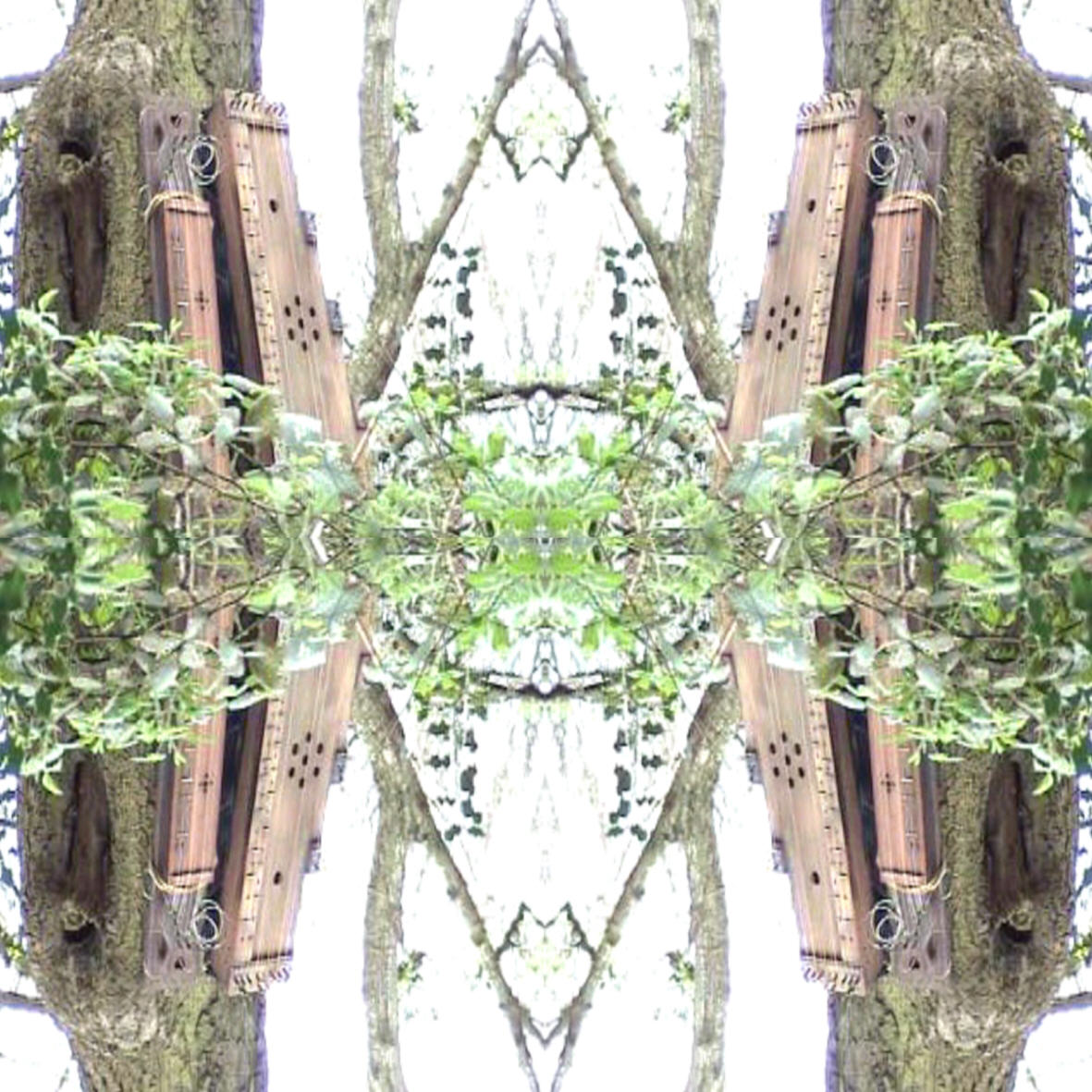
contact: zithersongs@sedayne.co.uk
~ Reviews ~
I'll recall to you, if I may, the duo Venereum Arvum (whose CD Scowan Arla Grun I reviewed last issue), by revealing that Sedayne is the name under which Sean Breadin (one half of Venereum Arvum) works when performing solo. Zithersongs comprises Sean's decidedly personal take on ten traditional ballads, self-accompanied on citera or hummel (both being types of board-zithers, the former Hungarian and the latter Swedish). Greatly informed by the discipline of storytelling, these are extended renditions (only one lasts less than six minutes), and yet their barren and somewhat ascetic demeanour (very reminiscent of "early music") proves curiously compelling once you've got used to Sean's strongly individual (and, though strongly accented, not in the least impenetrable) singing style. (Robin Williamson may well have been a direct inspiration on Sean, methinks… and that's a compliment!) As with the Scowan CD, there's an attractive drama and a definite seriousness of purpose in the interpretations, and Sean's scholarship is self-evident without seeming patronising to the listener. The recording is suitably atmospheric without being overdone, and I found that, if taken straight on its own terms rather than coming to it with expectations of modern-day tastes for easy-on-the-ear reworking of traditional material, this can be a rewarding listening experience. All texts, with extremely full notes, are at Sedayne's website (http://www.sedayne.co.uk/html). And by the way, Zithersongs comes with a bonus disc The Chapters Sessions, which consists, in Sean's own words, of "a session recorded in the attic room of The Chapters Guesthouse in Wells, Somerset earlier this year, on the morning of Sunday 8th May, in preparation for a solo storytelling gig at the Voicebox in Derby the following Wednesday". Again highly-charged in atmosphere, this disc presents Sean, his citera, melodica and pocket trumpet intoning more ballads (including alternate readings), a folk song medley, A U Hinney Bird and a setting of part of Psalm 32. It may all prove too much for some, but I found it hypnotic, imposing and fascinating.
David Kidman - Folk Roundabout, December 2005
This album reveals the true essence of (story-telling in song) troubadour music mixed with a magical, deep mystical touch. Sedayne here took the citera as his basic instrument to play, which he restored himself from an antique Hungarian instrument. It took him years to do this and to fully understand the essence and heart of this unique hand-made instrument. And he truly discovered the heart of it. The instrument has a beautiful colour, sound range and drone. Played on medieval-sounding ballads it never sounded so natural and rich. A second instrument he used is the related hummel.
Sean (from Sedayne) decided to make from the earlier "Zither Songs" recording, a double CD box also. Because all songs on the first release have the same elements in each song, the complete first CD should work as from a trance-vision, but on bad equipment and at some moments it could eventually become slightly tiring. The supplement in that way, starts with a surprise, because the first track, a Sedayne song, uses also some pocket trumpet, pulling your attention completely back in. Most tracks are traditionals. “Bird Robin” sound exactly like one, but it is a Sedayne track. For me the music truly works as I think they sound as original troubadour performances with its own vision, and natural portion of magic. It is as if Sean knows that the true feeling of how to perform and let the songs sound as if they’re from a magical world. At a time when I've put them against a conservative repetition of ideas of how medieval songs could be played Sedayne is on a truly different level, recalling the true spirit of ancient performances. The last track is with additional bird whistle and melodica. The supplement CD has over 77 minutes of music. For me it was as if it was over in a minute.
Gerald Van Waes - http://psychedelicfolk.homestead.com